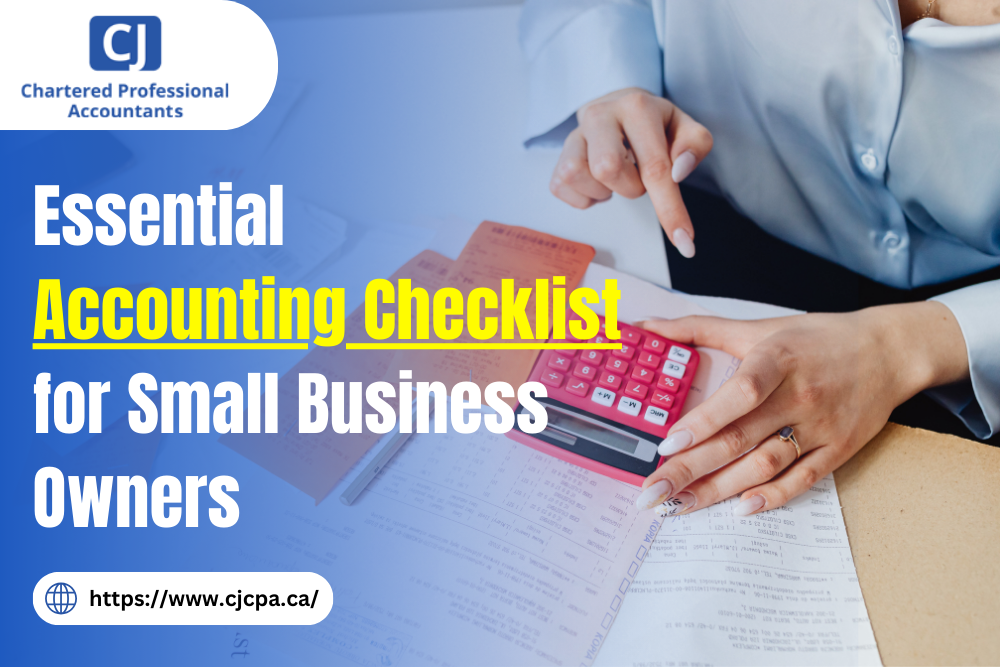Running a small business takes constant attention and often becomes a year-round focus. Midyear is the ideal time to review your finances and make necessary adjustments. But the second half of the year brings its own set of accounting challenges.
With tax deadlines approaching, budgets shifting, and year-end planning in full swing, many businesses are at risk of making costly business accounting mistakes. It is not from lack of effort, but from small oversights that quietly grow into bigger problems.
As December approaches, small businesses across Canada begin preparing for the financial wrap-up: tax filings, reconciliations, and year-end reviews. Under mounting pressure, many entrepreneurs make errors that hinder growth, strain cash flow, or draw scrutiny from the Canada Revenue Agency (CRA).
In fact, over
20% of small businesses are worried about cash flow, especially during year-end when expenses spike and tax obligations loom. That pressure often leads to rushed decisions, missed deadlines, and preventable financial missteps.
Here are five common business accounting mistakes SMBs make and how to stay ahead of them before they become bigger issues.
Top 5 Small Business Accounting Mistakes
1. Ignoring Tax Deadlines and Compliance
As the year winds down, tax responsibilities tend to pile up. Missing key deadlines like quarterly estimates or payroll taxes can lead to penalties and interest. Many business owners underestimate the time needed for preparation and end up rushing at the last minute.
Tip: Set calendar reminders for all tax dates. Check in with your
accountant every quarter. Use accounting software to stay organized and avoid last-minute stress.
2. Not Reconciling Bank Accounts
End-of-year chaos often pushes regular tasks like monthly bank reconciliations to the back burner. But skipping them opens the door for unnoticed errors or fraud, which can distort financial reports when you need them most.
Tip: Set aside time each month to review your bank statements. Match every transaction and investigate any inconsistencies right away.
3. Mixing Business and Personal Money
Busy seasons can make it tempting to use personal funds for business or the other way around. This creates confusion, complicates tax prep, increases audit risk, and may result in missed deductions. This practice is one of the most common business accounting mistakes entrepreneurs make.
Tip: Keep business and personal finances separate. Use different bank accounts and credit cards. Track expenses with accounting tools designed for small businesses.
4. Mislabeling Expenses
Spending usually ramps up at year-end for things like bonuses, marketing, or inventory. This often leads to expenses being categorized incorrectly, which can distort financial statements and raise red flags during tax filing.
Tip: Review expense categories regularly. Train your team or
accountant to classify expenses properly. Double-check everything at the end of each quarter.
5. Disorganized Records and Unpaid Invoices
During busy periods, it’s easy to fall behind on paperwork. This can cause businesses to lose track of invoices, miss income, or file incomplete tax returns. This accounting mistake can later make it difficult to file taxes and claim all eligible deductions, or even lead to CRA audits. Click to find out the most common
CRA Audit reasons.
Tip: Use digital tools to automate reminders and document storage. Review unpaid invoices monthly and follow up to maintain healthy cash flow.
Frequently Asked Questions (FAQs)
1. What are the most common accounting mistakes small businesses make midyear?
Failing to reconcile bank statements, mixing personal and business finances, misclassifying expenses, neglecting receivables, and missing tax deadlines are all frequent issues. Fixing them early prevents larger problems later.
2. How can timely bank reconciliations improve my cash flow management?
They help you catch errors, prevent fraud, and maintain an accurate view of your available funds. With up-to-date reconciliation, you make better financial decisions.
3. Why is it risky to mix business and personal finances?
It increases audit risk and can lead to lost deductions or inaccurate records. Keeping finances separate simplifies compliance and improves financial clarity.
4. How can staying organized with expense categories help at year-end?
Proper categorization helps you prepare accurate tax filings, take full advantage of deductions, and manage your budget more effectively.
5. What should I do if managing accounting tasks gets overwhelming?
Seek help from an experienced accounting professional. They can streamline your processes and ensure your records and reports are accurate and compliant.
6. How to fix bad bookkeeping?
Review your records closely to spot errors or missing entries. Reconcile your books against bank and credit card statements to catch discrepancies. Correct or update any transactions, and organize all your documents properly.
7. Is it normal to make mistakes in accounting?
Yes, accounting mistakes happen, especially during busy periods or when adopting new processes or software. The important thing is to identify and correct errors quickly to avoid long-term consequences.
8. How to avoid mistakes in accounting?
Record every transaction promptly, reconcile your accounts monthly, and use reliable accounting software to streamline processes. Train your team on accurate data entry, expense categorization, and regular book reviews to catch and fix errors early.
Final Thoughts
Year-end can be a stressful time for small business owners, but avoiding these common business accounting mistakes can save time, money, and unnecessary headaches. Staying organized, separating finances, and keeping accurate records aren’t just best practices but a catalyst for long-term business success.
At CJCPA, we work closely with small business owners to clean up books, organize records, and prepare for taxes the right way. Whether you need help catching up or staying compliant, we’re here to make things easier.
Let’s finish the year strong. Less stress, better records, and more peace of mind. Reach out to CJCPA-we’ve got your back.
Tell us how we can help!
Contact us today.



